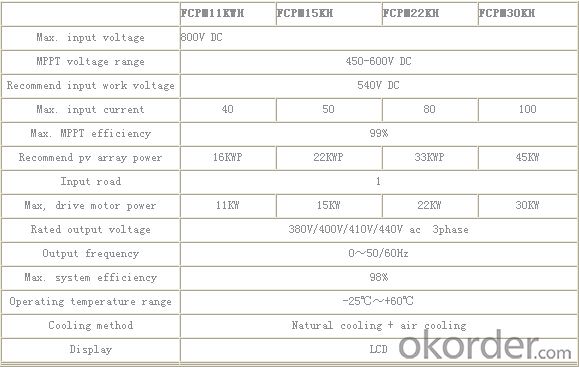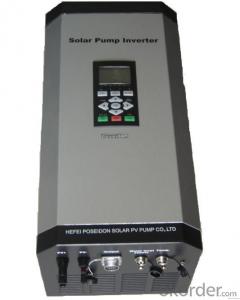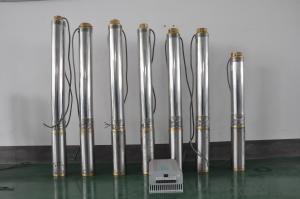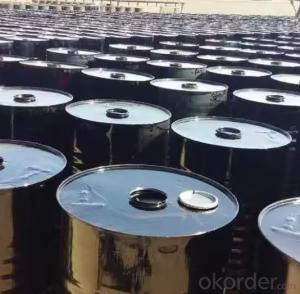Solar pump inverter FCPM11KH
- Loading Port:
- China Main Port
- Payment Terms:
- TT OR LC
- Min Order Qty:
- -
- Supply Capability:
- -
OKorder Service Pledge
Quality Product, Order Online Tracking, Timely Delivery
OKorder Financial Service
Credit Rating, Credit Services, Credit Purchasing
You Might Also Like
Solar pump inverter FCPM11KH Product Description:
Solar water pumping system is constructed with solar panel array,solar pump inverter and AC water pump, DC current produced from solar panel will be delivered to solar pump inverter,and it will convert it into AC current to drive water pump,and will automatically regulate output frequency according to sun radiance intensity,maximally realize MPPT tracking function.
Features
Adopting the proposed dynamic VI maximum power point tracking (MPPT) control method, with fast response, and reliable operation, achieves efficiency of 99%.
Designed with variable frequency driver, greatly improves efficiency
Extremely high efficiency
Digital mode control, with automatic operation and manual operation mode options
Complete protection functions
Adopts intelligent IPM module, with high reliability
LCD display and operation panel, in real time presents operating data
Optional for water level measurement and control circuit
Applicable for general ACC pumps, like centrifugal pump, piston pump etc.
Independent intellectual property; Highly effective, the redundant reliability, exempts the maintenance and the long life.
The pumps are soft started, fully protected.
No batteries are used. So better Sunlight, more water.
Datasheet.

- Q:Can a solar pump be used in areas with high levels of radon in the water?
- No, a solar pump cannot be used in areas with high levels of radon in the water. Radon is a radioactive gas that can be harmful to human health if ingested or inhaled. Solar pumps are designed to extract water from underground sources, and if the water contains high levels of radon, it poses a significant health risk. Therefore, alternative water extraction methods should be considered in such areas to ensure safe and healthy water supply.
- Q:Can a solar pump be used for industrial processes requiring water circulation?
- Indeed, industrial processes that necessitate water circulation can make use of a solar pump. Due to their numerous advantages, solar pumps are increasingly being employed in various industrial applications. These pumps are powered by solar energy, rendering them eco-friendly and cost-efficient compared to traditional pumps that rely on fossil fuels or electricity. Solar pumps can be specifically designed to handle large quantities of water and serve various purposes, such as irrigation, water supply, and water circulation in industrial processes. They are particularly valuable in remote areas where grid electricity may not be accessible or dependable. With the continuous advancements in technology, solar pumps have now become capable of delivering high water pressures and flows, making them suitable for industrial processes that require efficient water circulation. They can be seamlessly integrated with storage systems or battery banks to ensure uninterrupted operation even during periods of limited sunlight. Furthermore, solar pumps can be equipped with variable frequency drives (VFDs) to regulate the flow rate and pressure of the pumped water, allowing for precise control and optimization of industrial processes. All in all, solar pumps prove to be a practical and sustainable solution for industrial processes that demand water circulation. They offer a multitude of benefits, including reduced operating costs, environmental friendliness, and reliable performance.
- Q:Can a solar pump be used for water supply in vineyards?
- Yes, a solar pump can be used for water supply in vineyards. Solar pumps are a sustainable and efficient option that can harness energy from the sun to power the pump and provide water for irrigation in vineyards. This reduces the reliance on electricity or fuel-powered pumps, making it a cost-effective and environmentally friendly solution.
- Q:What are the safety measures to be taken while installing a solar pump?
- Some safety measures to be taken while installing a solar pump include: 1. Ensure proper training: Installers should be adequately trained on the installation process and safety protocols specific to solar pumps. 2. Use appropriate personal protective equipment (PPE): Installers should wear safety gear such as gloves, safety glasses, and non-slip shoes to protect against potential hazards. 3. Conduct a site assessment: Assess the installation site for any potential risks, such as unstable ground or nearby electrical hazards, and take necessary precautions. 4. Disconnect power sources: Before starting the installation, ensure that all power sources are properly disconnected to prevent electric shocks or accidents. 5. Follow manufacturer instructions: Carefully read and follow the manufacturer's instructions for installation, maintenance, and safety procedures. 6. Secure the panels and equipment: Ensure that solar panels, pumps, and any accompanying equipment are securely fastened to prevent accidents due to falling or shifting components. 7. Proper grounding: Establish a proper grounding system to reduce the risk of electrical hazards and ensure the safety of the pump and its users. 8. Regular maintenance checks: Regularly inspect and maintain the solar pump system to identify any potential issues or safety concerns and address them promptly. 9. Consult professionals if needed: If unsure about any aspect of the installation or encountering unexpected complications, it is advisable to consult a professional or seek expert guidance. 10. Follow local regulations and codes: Adhere to relevant local regulations, building codes, and safety standards specific to solar pump installations to ensure compliance and safety.
- Q:What is the impact of a solar pump on wildlife conservation?
- The impact of a solar pump on wildlife conservation can be significant. By providing a sustainable source of water in remote areas, solar pumps can help create and restore habitats for various wildlife species. Access to clean water supports the survival and reproduction of animals, enabling them to thrive and maintain healthy populations. Additionally, solar pumps reduce the need for human intervention in traditional watering methods, minimizing disturbances to wildlife and their habitats. Overall, solar pumps contribute to the conservation of wildlife by promoting ecosystem balance and enhancing biodiversity.
- Q:Can a solar pump be used in areas with limited access to water pressure gauges?
- Yes, a solar pump can be used in areas with limited access to water pressure gauges. Unlike traditional pumps that rely on electricity or fuel, solar pumps operate using solar energy, making them suitable for remote locations without access to power grids or infrastructure. While water pressure gauges are useful for monitoring and adjusting the system, they are not essential for the basic functioning of a solar pump. The pump can still efficiently draw water from a source, such as a well or a reservoir, and deliver it to the desired destination, even without pressure gauges.
- Q:Can a solar pump be used for water supply in off-grid cabins or remote cottages?
- Yes, a solar pump can be used for water supply in off-grid cabins or remote cottages. Solar pumps are a sustainable and cost-effective solution for these remote locations where access to conventional power sources may be limited. By harnessing energy from the sun, solar pumps can draw water from wells or other water sources and provide a reliable water supply for daily needs such as drinking, cleaning, and irrigation.
- Q:How much does a solar pump cost?
- The cost of a solar pump can vary depending on factors such as the brand, capacity, and additional features. On average, a basic solar pump can range from $500 to $2,000, while more advanced models with higher capacities can cost anywhere from $2,000 to $10,000 or more.
- Q:Can a solar pump be used for water supply in parks or recreational areas?
- Yes, a solar pump can definitely be used for water supply in parks or recreational areas. Solar pumps are a sustainable and environmentally friendly option for water supply as they utilize solar energy to operate. They do not require grid electricity or fuel to run, making them cost-effective and reducing the carbon footprint. Solar pumps can be used to pump water from a source like a well, pond, or river and distribute it throughout the park or recreational area for various purposes, including irrigation, drinking water fountains, decorative water features, and even for filling up swimming pools or water play areas. They can be easily installed and require minimal maintenance, making them an ideal choice for parks and recreational areas where a reliable and efficient water supply is essential.
- Q:Are there different types of solar pumps?
- Yes, there are different types of solar pumps. Some common types include submersible solar pumps, surface solar pumps, and solar pool pumps. Each type is designed for specific applications and comes with its own features and benefits.
1. Manufacturer Overview |
|
|---|---|
| Location | |
| Year Established | |
| Annual Output Value | |
| Main Markets | |
| Company Certifications | |
2. Manufacturer Certificates |
|
|---|---|
| a) Certification Name | |
| Range | |
| Reference | |
| Validity Period | |
3. Manufacturer Capability |
|
|---|---|
| a)Trade Capacity | |
| Nearest Port | |
| Export Percentage | |
| No.of Employees in Trade Department | |
| Language Spoken: | |
| b)Factory Information | |
| Factory Size: | |
| No. of Production Lines | |
| Contract Manufacturing | |
| Product Price Range | |
Send your message to us
Solar pump inverter FCPM11KH
- Loading Port:
- China Main Port
- Payment Terms:
- TT OR LC
- Min Order Qty:
- -
- Supply Capability:
- -
OKorder Service Pledge
Quality Product, Order Online Tracking, Timely Delivery
OKorder Financial Service
Credit Rating, Credit Services, Credit Purchasing
Similar products
New products
Hot products
Hot Searches
Related keywords



























